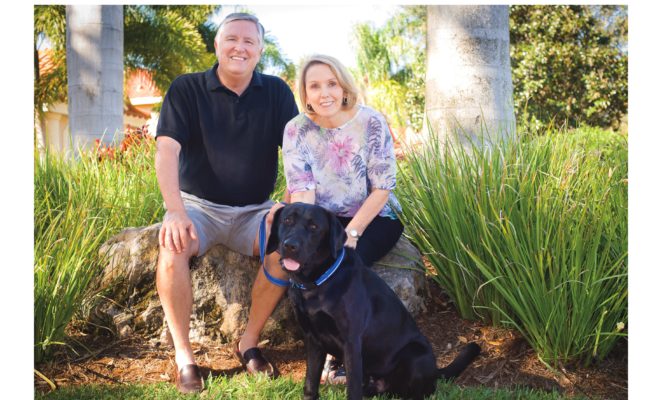
Philanthropy
Top Dogs: Michael & Jann Nohe
By Steven J. Smith | Photo By John Revisky
Michael and Jann Nohe are proud to say they’ve “gone to the dogs” — volunteering for and donating to Southeastern Guide Dogs, an organization that transforms lives by training dogs to aid veterans and the blind.
“Marge and Itzik Barpal, who donated quite a bit of money to their veterinary and student centers, invited us to come to a graduation ceremony,” Jann said. “Eight or nine visually impaired people were formally receiving their guide dogs and talking about what it meant to them.”
“It was a real tearjerker, when you realize how these dogs are going to change their lives,” Michael added. “In some cases the dogs actually give these people their lives back, because they regain mobility and confidence. It’s a very moving experience.”
Those interested in partnering with Southeastern Guide Dogs, they learned, may do so by donating to its Cornerstone Society, a program in which benefactors contribute to it annually for three years — in increments of $1,200-$4,999, $5,000-$9,999 or $10,000 and above — to build the organization’s financial future.
The Nohes enthusiastically joined the Cornerstone Society but wanted to do more, so they became “puppy raisers,” which is the process of fostering a puppy and preparing it for the training it will need to assist a future visually impaired master. Breeds include Labrador retrievers, golden retrievers or a blend of the two, called goldadors. Puppy raisers incur no costs other than food and dog toys. The organization picks up all veterinary costs. Volunteers receive their pups at about nine weeks of age, teach them basic obedience skills and take them everywhere — to work, out to eat, on trips, even grocery shopping. This real-world exposure prepares the puppies for the actual situations they must master to later successfully guide a visually impaired person.
“You start with the basic commands: sit, stay, down, that kind of thing,” Jann said. “But the real goal is to domesticate them — housebreak them, give them good manners.”
As the puppy matures and the puppy raiser feels he is able to handle it, the dog is gradually exposed to increasingly complicated mixes of unusual and active situations that he might experience later on as a guide dog — such as walking in crowds or dealing with loud sounds. After about 14-16 months, the dog returns to “school” for harness training.
“Everything you’re doing with the dog, you’re keeping in mind your readying it for someone who is visually impaired,” Michael said. “For example, when you put on a harness, you use the method a blind person would use.”
Originally from Maryland and Pennsylvania respectively, Michael and Jann spent 25 years in the Princeton, N.J. area before moving to Osprey in 2007. He was a research analyst for a buy-side Wall Street firm for over 20 years, while she left that same business to have their kids then teach quilting.
“This is where we wanted to retire,” Michael said. “We always wanted to move down here. We vacationed here quite a bit and really love the area.”
They are also avid dog lovers and relished the opportunity to raise their assigned puppy, Spencer, into a guide dog that was eventually placed with a veteran suffering from post-traumatic stress disorder. Giving him up was a bittersweet experience.
“They have a saying at Southeastern,” Michael said. “It’s ‘You love the dog and you want the dog, but there’s somebody who needs the dog.’ That’s true, but it doesn’t make it a whole lot easier. So after we turned Spencer back in, we participated in puppy sitting, which is when you watch a dog for a day or a week or so. We also ‘finished’ a couple of dogs, which means we completed the training that another raiser could not do.”
“Now we have a male breeder dog,” Jann said. “His name is Shadow and he is among the best of the best for breeding the next generation of guide dogs. He’s already bred six litters, which totals about 50 puppies. Southeastern breeds dogs like him eight to ten times. When they’re done breeding him, they’ll neuter him and he’ll be our dog forever.”
Jann added she and Michael have been involved with a lot of charities and praised the way Southeastern Guide Dogs is run.
“They serve a wonderful purpose,” she said. “And we love dogs. So it’s not like we’re giving up a lot. We have a fabulous dog that we really love. It’s a win-win situation.”
“You see results where this organization really changes people’s lives in a very positive way,” Michael added. “I think they do it efficiently. When you give them money, you know there are going to be good results.”
For more information about Southeastern Guide Dogs, contributing to its Cornerstone Society or becoming a puppy raiser, visit the website at www.guidedogs.org.



You must be logged in to post a comment Login